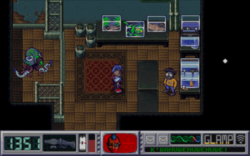Baldurs Gate - Never Forget
Baldurs Gate - Never Forget
Interview - posted by VentilatorOfDoom on Mon 16 August 2010, 19:52:32
Tags: Baldur's Gate II: Shadows of Amn; BioWareRPS had the opportunity to chat with the BioDocs and they looked back at their breakthrough game, Baldur's Gate - the start of all that emotional engagement enthralling us to this very day.
Ray: Interplay had the Dungeons and Dragons license through TSR so what they provided was converting the engine to Dungeons and Dragons instead. We thought that would be a good license to develop in.
Greg: what we always wanted to make was the experience of that top-down experience. That top-down world exploration of Ultima was a really big inspiration for us. One thing that’s important to realise was we started it back in the mid-90s, and that was when RPGs were dead in North America. People would kind of scoff when you said you were making one.
Ray: A lot of publishers were saying RPGs were not the place to be and there was not a future for them. We disagreed, we wanted to go back to our favourite games of the 80s and early 90s. All these amazing games that provide these rich experiences. We wanted to create something to capture that magic.
Greg: We have a way of describing it now, historically we didn’t have the language to explain it. What we moved to was the concept of Bioware’s 4 pillars. The idea of exploration, incredible territory to explore. Combat, you had to think you had to plan, by changing tactics you could be successful. Characters…
Ray – We looked at RTSes, C&C and WoW, you’d click on characters and they’d say something back to you, and it was a surprise. Jagged Alliance, one character would take out a gun and start shooting another because they’d had an argument. We wanted to make them feel like real people, not NPCs who were AI controlled, they really felt they had personalities and came to life.
thanks to Jaedar for pointing this out.
Ray: Interplay had the Dungeons and Dragons license through TSR so what they provided was converting the engine to Dungeons and Dragons instead. We thought that would be a good license to develop in.
Greg: what we always wanted to make was the experience of that top-down experience. That top-down world exploration of Ultima was a really big inspiration for us. One thing that’s important to realise was we started it back in the mid-90s, and that was when RPGs were dead in North America. People would kind of scoff when you said you were making one.
Ray: A lot of publishers were saying RPGs were not the place to be and there was not a future for them. We disagreed, we wanted to go back to our favourite games of the 80s and early 90s. All these amazing games that provide these rich experiences. We wanted to create something to capture that magic.
Greg: We have a way of describing it now, historically we didn’t have the language to explain it. What we moved to was the concept of Bioware’s 4 pillars. The idea of exploration, incredible territory to explore. Combat, you had to think you had to plan, by changing tactics you could be successful. Characters…
Ray – We looked at RTSes, C&C and WoW, you’d click on characters and they’d say something back to you, and it was a surprise. Jagged Alliance, one character would take out a gun and start shooting another because they’d had an argument. We wanted to make them feel like real people, not NPCs who were AI controlled, they really felt they had personalities and came to life.














